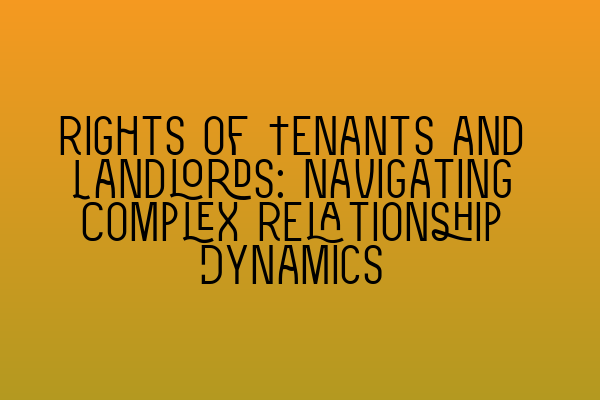Rights of Tenants and Landlords: Navigating Complex Relationship Dynamics
Renting a property can be an exciting prospect, offering flexibility and the opportunity to create a comfortable home. Whether you are a tenant looking for a place to live or a landlord seeking to invest in real estate, it is crucial to understand the rights and responsibilities that come with the landlord-tenant relationship. This blog post will explore the rights of tenants and landlords, outlining the various legal aspects involved and shedding light on the complex dynamics that surround this vital arrangement.
Understanding the Rights of Tenants
Tenants have a set of legal rights that protect them from unfair practices and ensure their well-being. These rights encompass several key areas:
1. Right to a Habitable Property
As a tenant, you have the right to live in a safe and habitable home. Landlords are responsible for maintaining the property’s structural integrity, taking care of repairs, and ensuring that essential services like heating, plumbing, and electricity are in good working condition. If your landlord fails to meet these obligations, you may have legal recourse to seek remedies such as rent reduction or termination of the lease.
2. Right to Privacy
Tenants have a right to privacy within their rented property. Landlords should provide reasonable notice before entering the premises, except in cases of emergencies or specific provisions in the lease agreement. It is important to familiarize yourself with the local laws regarding landlord access rights to protect your privacy and personal space.
3. Right to Be Protected from Discrimination
Landlords are prohibited from discriminating against tenants based on factors such as race, religion, gender, disability, familial status, or other protected characteristics. If you believe you have been a victim of discrimination, it is crucial to reach out to local housing authorities or seek legal advice to protect your rights.
4. Right to a Fair Rent and Security Deposit
Tenants have the right to be charged a fair rent based on the market value of the property. Additionally, landlords must follow specific regulations regarding security deposits. These regulations typically include refunding the deposit within a certain timeframe and providing a detailed explanation of any deductions made. Familiarize yourself with the local laws governing rent control and security deposits to ensure you are being treated fairly.
Understanding the Rights of Landlords
While tenants have certain rights, landlords also have their own set of legal rights designed to protect their investment and maintain control over their properties:
1. Right to Collect Rent
Landlords have the right to collect rent from their tenants as agreed upon in the lease agreement. However, they must follow the appropriate legal procedures to evict a tenant for non-payment or other breaches of the lease. Landlords should be aware of the specific eviction laws and processes in their jurisdiction to safeguard their rights while adhering to legal requirements.
2. Right to Properly Screen Tenants
Landlords have the right to screen potential tenants to ensure they will be responsible, reliable, and able to meet their financial obligations. Screening processes may include reviewing credit histories, conducting background checks, and verifying references. However, it is important to follow regulations governing tenant screening to avoid discrimination or unfair practices.
3. Right to Property Maintenance
Landlords have the responsibility to maintain their properties and ensure they are in a habitable condition. This includes addressing repairs promptly, maintaining common areas, and complying with health and safety codes. However, landlords also have the right to enter the property for inspections or repairs, as long as they provide reasonable notice to the tenant.
4. Right to Protect Their Property
Landlords have the right to protect their property from damage caused by tenants. They can hold tenants responsible for any excessive damages beyond normal wear and tear, and they may deduct the cost of repairs from the security deposit. However, landlords must follow proper procedures and provide an itemized list of deductions to comply with legal requirements.
The Importance of Communication and Documentation
Navigating the relationship between tenants and landlords can be complex, but clear communication and documentation can help prevent misunderstandings and resolve disputes. It is essential for both parties to keep records of important communications, such as lease agreements, repair requests, or any changes to the tenancy. These documents can be invaluable in resolving disagreements and protecting the rights of both tenants and landlords.
Additionally, seeking professional legal advice can provide valuable insights and guidance in understanding the intricacies of tenancy law. Whether you are a tenant or a landlord, having a solicitor who specializes in property law can ensure that your rights are protected and that you are compliant with the relevant legal requirements.
Conclusion
The relationship between tenants and landlords is a complex one, governed by numerous rights and responsibilities. Understanding these rights is crucial for both parties to ensure a fair and harmonious living arrangement. As a tenant, knowing your rights will help you protect yourself from unfair practices, while as a landlord, understanding your rights will contribute to the successful management of your property. By communicating effectively, documenting important information, and seeking professional advice when needed, tenants and landlords can navigate the complexities of their relationship with confidence.
Related Articles:
- Misrepresentation in Contracts: Unveiling Deceptive Practices
- A Closer Look at SQE Contract Law Syllabus
- SQE Contract Law: Analyzing Landmark Cases and Influential Judicial Decisions
- Understanding Contractual Capacity: Rights and Limitations
- Interactive SQE Mock Tests for Contract Law: Test Your Knowledge
